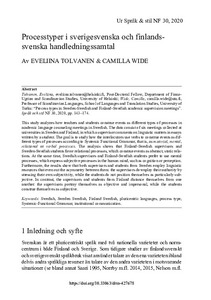Processtyper i sverigesvenska och finlandssvenska handledningssamtal
Eveliina Tolvanen; Camilla Wide
https://urn.fi/URN:NBN:fi-fe2021042821293
Tiivistelmä
This study analyzes how teachers and students construe events as different types of processes in academic language counseling meetings in Swedish. The data consists of six meetings collected at universities in Sweden and Finland, in which a supervisor comments on linguistic matters in essays written by a student. The goal is to study how the interlocutors use verbs to construe events as different types of processes according to Systemic Functional Grammar, that is, as material, mental, relational or verbal processes. The analysis shows that Finland-Swedish supervisors and Sweden-Swedish students favor relational processes, which construe events as abstract, static relations. At the same time, Swedish supervisors and Finland-Swedish students prefer to use mental processes, which express subjective processes in the human mind, such as cognition or perception. Furthermore, the results show that both supervisors and students from Sweden employ linguistic resources that even out the asymmetry between them: the supervisors downplay their authority by stressing their own subjectivity, while the students do not position themselves as particularly subjective. In contrast, the supervisors and students from Finland distance themselves from one another: the supervisors portray themselves as objective and impersonal, while the students construe themselves as subjective.
Kokoelmat
- Rinnakkaistallenteet [27094]
